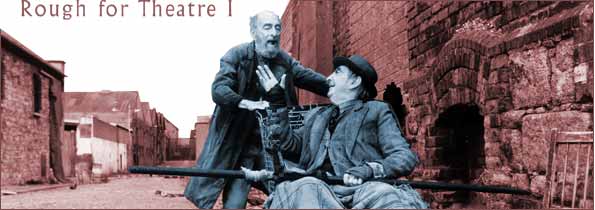The Rising of the Moon By Lady Gregory: In Summary
So, I decided to share with all my followers and readers here on my blog some of the interesting plays I have enjoyed reading and reflecting about through the fall semester of 2013. I will be sharing some of my writings that I basically have done for my Theater classes, in which I enjoyed taking the most since the first days I started going to college. And with all pleasure, here's one of my most favorite plays that I pretty much enjoyed reading about through this semester. So, I hope you guys enjoy reading it or even get an idea of the play's theme, climax and plot and also if you find it really interesting you might consider searching for the play itself and start reading it and by then you will see realize why I consider it as one of the most favorite plays I have ever enjoyed reading , back when I had to study it in my theater literature class.
Happy reading :)
The Rising of The Moon
By Lady Gregory:
It
is one of Lady Gregory’s shortest but most famous and very well known plays
that politics takes a place in its themes. This play was premiered at the Abby
Theatre 1907. This play opens with three Irish policemen who are obviously working
for the British authorities and a man hunt for an escaped political prisoner.
The policemen then comes to discuss the large reward money they will receive
for the criminal’s capture and as two of the policemen go off, the Sergeant
stays to guard the harbor where he thinks a ship is bound to take the rebel to
freedom. The Sergeant meets a poor peasant man who passes the time singing
songs of Ireland. After that, the singer comes in and engages the Sergeant in
conversation which drifts towards the past. The Sergeant begins to think of the
fate of the fugitive in comparison to his own. He thinks about the friends of
his youth, and the circumstances which could have placed him in this type of
position and especially when he has to hide from the police in the dark. The
Sergeant undergoes a change of heart with the disguised rebel begins to sing the
song of the Fenian Movement that was composed around 1865, of The Rising of the
Moon. So moved is the sergeant by memories of his own patriotic youth that he
allows the criminal to escape and gives up his chance of the reward and his
duty towards the British government. This play shows mistaken identity through
disguise; in this case a wig and a hat.
 |
| Lady Gregory the playwright of The Rising of the Moon |
On the
other hand, as we go deeper on reading this play we will realize the moment
when the Sergeant does not recognize his quarry because of Walsh’s costume. Also,
the wearing of the disguise enables Walsh to get close to his enemy so that the
Sergeant can unveil his own identity with the removal of Walsh’s wig.
Eventually, when the Sergeant discovers that Walsh is indeed the criminal he
has been seeking, he performs his complicity with the nationalist movement by
hiding Walsh’s wig and hat from the other policeman. After the policemen leave,
the Sergeant again performs his own collusion by giving Walsh back his disguise
so the rebel can continue to delude others. In this way, the disguise performs
the entire journey towards the discovery of the Sergeant’s “true” identity
underneath his mask of law and duty; the use and exchange of the disguise are
similar to the exchanges of identity between the Irish man representing British
rule and the Irish man representing the rebellion.



I enjoyed reading all your bolgs wish you happiness and more successful life and bright day.
ReplyDeletePS, will always remain in my heart